
 |
|
|||||||
| Forum Rules | Firearms Safety | Firearms Photos | Links | Library | Lost Password | Email Changes |
| Register | FAQ | Calendar | Today's Posts | Search |
 |
|
|
Thread Tools | Search this Thread |
|
|
#126 |
|
Senior Member
Join Date: October 31, 2000
Location: Texican!
Posts: 4,453
|
Better yet, it's smart to train hard and keep in condition yellow so as not to end up being ambushed. One's fine motor control might degenrate to gross motor control, but gross motor control never degenerates to fine motor control.
I can understand Fairbrain's methods in the orient. After all, he had something like 50 rounds per person per year for training with guns that had horrable sights and with people who were definitly not gun people. But this is America and I think we can do lots better than that. The only thing to avoid is unnessary complexity. Pair down your skill set to what is needed (and you are capable of) and then train hard and often. If you are a Van Cliburn with a shoot'en iron, then the skys the limit. Just make sure you keep your eyes open out there and don't drop the ball.
__________________
“To you who call yourselves ‘men of peace,’ I say, you are not safe without men of action by your side” Thucydides |
|
|
|
|
#127 |
|
Junior member
Join Date: June 7, 2002
Location: NYC
Posts: 363
|
Anyone can be ambushed.
And anyone can have a bad day. It is also unpractical to recommend constant training to the majority of gun owners who have neither the time nor the inclination to do this. Happily there are alternatives to constant training, which blends in nicely with the loss of fine motor skills--should they occur. BTW..who is Fairbairn? |
|
|
|
|
#128 |
|
Senior Member
Join Date: September 26, 2005
Location: Northern Virginia
Posts: 6,141
|
W.E.Fairbairn and E.A. Sykes were officers in the Shanghai, China, in the 1920's and 1930's. In the 1940's they went to Great Britain and helped train commandos in close combat. Rex Applegate was one of their students. Together they published a book entitled "Shooting to live" in which they outlined their ideas and training methods. One of the more interesting things about them was that the Shanghai Police used mostly Colt 1911 automatics, in .45ACP of course. Their methods could not be said to be controversial at all and for that day, they were rather progressive. Nowadays, some people claim their methods are dated. More likely, the most accurate criticism would be that the book was really written for large police departments. Also, there are gaps in the book in the sense that I am sure many things were taught that did not make it into the book. After all, it is only one book.
They also designed their famous combat knife, the Fairbairn-Sykes commando dagger. In their book they never mention rifles (shotguns, yes), hunting, and competitive target shooting, other than to say they were opposed to it as a realistic preparation for combat. They do talk about stopping power but refused to be dogmatic and were not very conclusive about it. All in all, it is a thin book. They also do not mention street tactics in any way beyond shooting stances. The Shanghai Police Department was exceptionally large and well paid and also multinational. There were Europeans, Chinese and Indians officers in the department. Shanghai was considered to be a dangerous city at the time and may still be. At the moment it is a real boom town according to one of my barbers, who is from there.
__________________
Shoot low, sheriff. They're riding Shetlands! Underneath the starry flag, civilize 'em with a Krag, and return us to our own beloved homes! Buy War Bonds. |
|
|
|
|
#129 | ||
|
Junior member
Join Date: January 24, 2005
Location: SW Louisiana
Posts: 2,289
|
Quote:
Quote:
|
||
|
|
|
|
#130 |
|
Senior Member
Join Date: October 31, 2000
Location: Texican!
Posts: 4,453
|
Actually in Shanghai the Brits did use .45 1911s, but their oriental brothers, being of small stature, used .380 Colt autos. That is from W.E.Fairbairn's own book about what he did there.
The Chinese did not have really any gun handling skills before entering the service (let's just say they had no NRA and no gun rights.) And 50 rounds was it. Up to Fairbairn's time they used pure bullseye shooting, with the other hand in the off pocket, which isn't in anybodys combat book, from Askins to Cooper to Joran. I'll also say, being here in Texas and seeing lots of CHL students as well as range shooters, that most have some inkling of guns before they enter the course and they most certanly end up with more than 50 rounds per year (but I would not say 50 rounds per month!) But to bemoan ,and end up by default, expecting training to devolve to, what, never learning anything but having the weapon on ones hand already and spraying the target with burst of several rounds (and yes, Fairbairn did advocate just that) I say is not encouraging. It's a step backwards, not forwards. Hey, Temkin, strange you would not know Fairbairn, since on Amazon you gave a review of his book. And yes, I have his book, along with oh, maybe a dozen others about such subjects.
__________________
“To you who call yourselves ‘men of peace,’ I say, you are not safe without men of action by your side” Thucydides |
|
|
|
|
#131 |
|
Junior member
Join Date: June 7, 2002
Location: NYC
Posts: 363
|
Amazon?
You mean that tribe of large women from Brazil? |
|
|
|
|
#132 | |||
|
Junior member
Join Date: January 24, 2005
Location: SW Louisiana
Posts: 2,289
|
Quote:
Quote:
Quote:
|
|||
|
|
|
|
#133 |
|
Senior Member
Join Date: September 26, 2005
Location: Northern Virginia
Posts: 6,141
|
One source stated that the Shanghai Police used large frame Webleys, in addition to their automatics, was simply because they had them. I believe it stated that it was mainly the Indian personnnel who were issued the revolvers. They also used long guns to some extent and supposedly it was European officers who were issued 1911's.
Another interesting point from today's perspective was that officers coming off their shift would turn in their handguns, which would then be reissued to the next shift. That meant they required about two-thirds the number of handguns as they had officers or two for every three officers. Fairbairn went to some length to defend the use of automatics over revolvers. At the time, there were very few double action automatics. There were a couple before the PP and PPK but it was years before anyone but the Germans used them in 9mm or any caliber that large, as near as I can remember. Some people have commented that it is easier to train people who have had no previous exposure to firearms. Americans are sometimes accused of all thinking they are experts on firearms, particularly handguns. I don't know if it is true or not but I suspect that adoption of the Beretta took up more time in congress than any airplane ever has, just for that reason. On the subject of target shooting, although Fairbairn was against it, many well known American lawmen, apparently all from the Southwest, mostly, were also successful in formal target shooters. And for some reason, most of them seemed to have been with the Border Patrol. So it is an arguable point as to the effect of competetive target shooting on gunfighting. But Shanghai was probably more dangerous then than the Great Southwest is even today, also an arguable point.
__________________
Shoot low, sheriff. They're riding Shetlands! Underneath the starry flag, civilize 'em with a Krag, and return us to our own beloved homes! Buy War Bonds. |
|
|
|
|
#134 |
|
Senior Member
Join Date: October 31, 2000
Location: Texican!
Posts: 4,453
|
Of course. Almost by definition, folks who go to the range somewhat regularly will shoot. Most shooters do not go to the range regularly, if at all.
Then they aren't shooters david, they are just gun owners. That is a BIG difference!
__________________
“To you who call yourselves ‘men of peace,’ I say, you are not safe without men of action by your side” Thucydides |
|
|
|
|
#135 | |
|
Junior member
Join Date: January 24, 2005
Location: SW Louisiana
Posts: 2,289
|
Quote:
|
|
|
|
|
|
#136 |
|
Senior Member
Join Date: March 21, 2006
Posts: 943
|
Okay, I bowed out but decided to step back in for one post.
I think there are two points here that are again being overlooked. They are that everyone should train - more. It is an idealistic and utopian viewpoint, but I believe everyone who carries a firearm for defense has the responsibility to become proficient in using them. The consequences are catastrophic. IMO, there is no excuse for lack of proficiency, this is especially true for those organizations whose members are required to carry a pistol every day. The second point is that mental training can and has been proven to make the difference in performance under stress/pressure. There is not enough training in this area. In my mind, it is a defeatist attitude to say that someone is going to lose control or fine motor skills under stress. That just simply is not true. It can't be predicted who or when it will happen. It is likewise defeatist to say that you can't train for it. You can. In fact, the right amount of pressure and stress make you perform better! Ask any Olympic Gold Medalist. The idea is to train physically to the point where the actions (flipping off the safety, drawing, acquiring sights, etc.) become subconcious. It doesn't take that much time to learn. The second part is to raise the comfort zone that your mind operates in - in terms of stress. If you introduce a higher level of stress/pressure to your mind it will adust to operating at that level (you have just expanded your boundaries as well). The next time you are at that level, you will perform better and each subsequent time. Then you raise the bar again. You don't have to go to the range to do this. Again, it is a utopian view, but it is very real and achievable. Some people just refuse to accept it. That's why 97% of success (shooting and otherwise) is achieved by 3% of those who compete. What do you think makes those 3% different? Some cannot comprehend events that occur outside of their paradigm. They cannot believe that someone can achieve those feats because they cannot themselves. This threatens the foundation of their world, so they simply shut it out and dismiss it as impossible. |
|
|
|
|
#137 |
|
Junior Member
Join Date: February 17, 2007
Location: Ohio
Posts: 1
|
At this point, I should probably just let this thread end, but I can't resist the temptation, so here goes:
There are four basic levels of competency regarding any particular skill or set of skills. First, there is unconscious incompetent, as in you are really bad at something but you don't even appreciate how bad you are. An example of this would be an infant learning to walk. They fall down a million times in the process, but their little minds aren't sophistocated enough to understand just how bad they are at it. (Fortunately, both their minds and bodies grow). Second is conscious incompetent, i.e. you are really bad at something but at least you are aware of your lack of skill. An example would be me trying to do perform brain surgery (I'm a lawyer, not a doctor). I would do a bad job, but I would fully appreciate how bad I was. Third is conscious competent, where you can perform a task if you are able to cognitively think your way through it using rational thought. An example of this is me making spaghetti: I can do it, but I have to consciously think about all the ingredients I need and in what order the steps have to be performed. As long as I have the benefit of rational thought, I can do a passable job. Finally is unconscious competent, where you are really good at something without any conscious effort or thought. An example is buttoning your shirt or tying your shoes, something you do flawlessly every day without even realizing it. This is where you want your fighting skills to be, and the only way to get there is repetition, i.e. training. There is a martial arts adage that says: "Repetition is the mother of all skill." The problem is this: Stress causes body alarm reaction, and the body alarm reaction essentially kills all rational thought. I won't get into all of it here, but the things that have been discussed such as the adrenaline dump and its associated effects such as elevated heart rate, etc. basically switch your brain from cognitve mode (thinking man) to survival mode (wild animal). Thus, when the body alarm fully hits, you can perform very well certain tasks that require gross motor skills like running, kicking, punching, etc., but other things that require rational thought or fine motor skills you can't do at all (crossword puzzles, field stripping your weapon, etc.) In other words, with the body alarm reaction you lose most if not all of your conscious, rational thought, and therefore, your conscious competent skills. Said another way, under stress your performance will revert to whatever level of training you have mastered. Proper training can minimize and/or delay the onset of the body alarm reaction such that you can still perform surprisingly well under pressure. Here is an example. It is my understanding that in the 1986 Challenger explosion, the pilot and co-pilot were seated up front to "fly" the spacecraft. The other five astronauts were essentially passengers strapped in the back to enjoy the ride until they got into orbit. When the tanks exploded, it took about 2 minutes or so for the shuttle to hit the ocean. During that time, the heart rate of the five in the back shot up to about 175 beats per minute, which indicates they were experiencing the full effects of body alarm reaction. However, the pilot and co-pilot never got above 100 beats per minute. The reason: training. They trained every day on how to keep the craft flying in every conceivable circumstance, going through scenario after scenario. When catastrophe struck, their minds literally kicked into auto-pilot, and they were focused on going through checklist after checklist, all the while plummeting to the earth. They were trained to deal with the worst possible case, and when it happened, they did as they were trained. Another example: Last April I was on my home late one night when a deer jumped out in front of me. There was nothing I could do, just bam, and she was rolling up my hood and over my roof. I wasn't exactly scared, but it was certainly a startling stimulus. Without even thinking about it, I braked to a stop, pulled over, and shifted into park. However, realizing that I was stopped partially on the roadway and should put my hazards on, I could not seem to find my hazard switch. The lady behind me stopped to see if I was okay. I told her was fine, but I couldn't find my hazard lights. She must have thought I was drunk, sitting there alternately trying to click the end of my turn signal on the left, and then the gear shift on the right of the steering wheel. Finally, she reached in and hit the button on the dash with the big red triangle on it. What happened? The deer running out in front of me was enough to kick in the body alarm reaction. Having been driving for 20 years, my ability to brake, stop the vehicle, and shift into park is an unconscious competent skill. I do it dozens of times every day of my life wihout conscious thought or effort. I don't have to look for the brake or the gear shift. However, I put my hazards on once in a blue moon, and to do so requires conscious thought, which I was incapable of for a few moments after impact due to the adrenaline rushing through my body. My guess is that I was trying to "click" the ends of my turn signal and gear shift because I used to own a car that had them there. It was pretty funny, though, because I was trying so hard yet couldn't seem to figure it out, like I was in a dream. Proper training will help anybody, but there are indeed some people who have trained themselves to actually take their game up another notch under pressure. The best examples I can think of are Michael Jordan and Tiger Woods. When the championship is on the line and the pressure is on, they actually get better. Don't ask me how, because I for one am not wired that way. So, I would not go so far as to say that the loss of fine motor skills is a myth. However, I would agree that the loss of fine motor skills can be minimized with proper training. |
|
|
|
|
#138 | ||
|
Junior member
Join Date: January 24, 2005
Location: SW Louisiana
Posts: 2,289
|
Quote:
Quote:
|
||
|
|
|
|
#139 |
|
Senior Member
Join Date: March 21, 2006
Posts: 943
|
DA
It's not a question of normal or not. Everyone can be trained that way. Not everyone wants to be. That is where the rubber meets the road. In terms of pracitcality, it isn't that impractical. Once someone has the basics down, if they would devote 15 minutes a day, two days a week (or more) they would be able to achieve a much higher level of training. Sadly, few people including LEO's place that high a value on training. When one potentially faces taking or losing a life (including their own) on a daily basis that really shouldn't be too much to ask. That is the reality, it's not that it cannot be done, it's that so few care (or have the discipline) to do it. |
|
|
|
|
#140 | |
|
Senior Member
Join Date: December 12, 1999
Location: Fort Collins, Colorado, USA
Posts: 2,682
|
Quote:
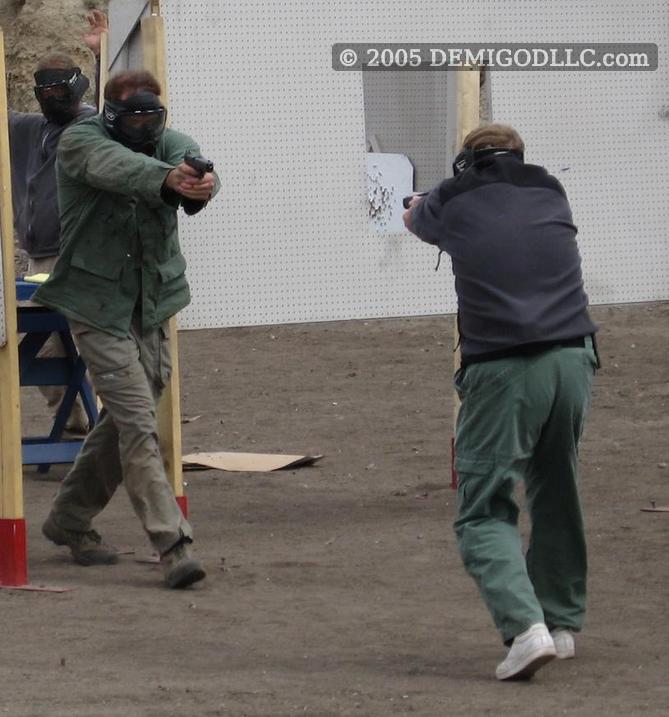 [ link to LARGER image ] [ link to LARGER image ]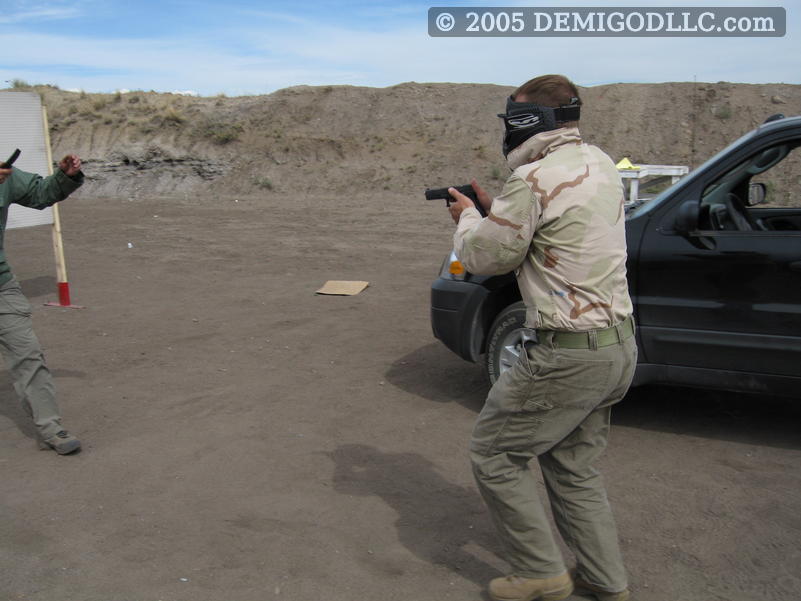 [ link to LARGER image ] [ link to LARGER image ]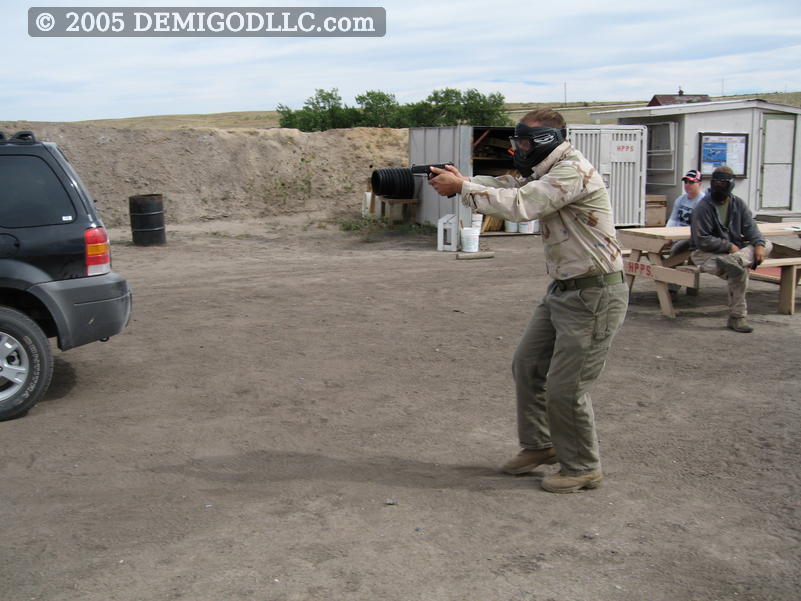 [ link to LARGER image ] [ link to LARGER image ]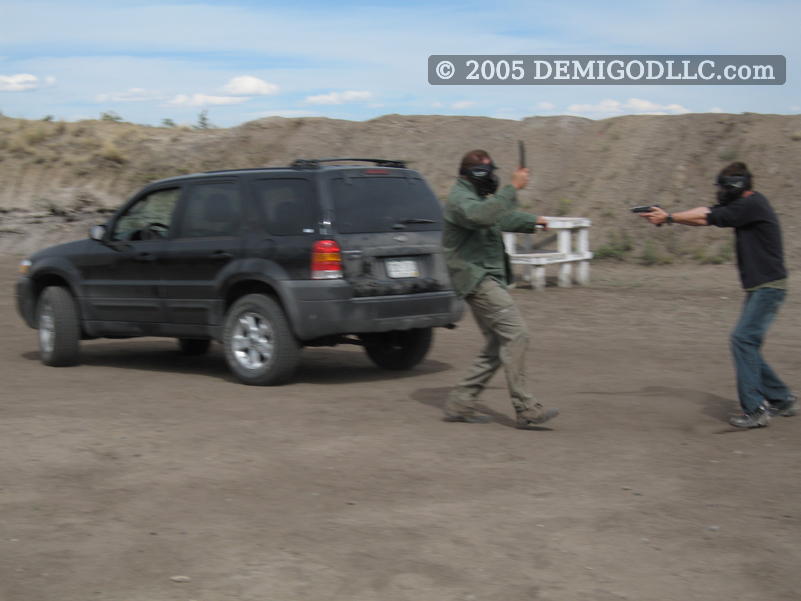 [ link to LARGER image ] [ link to LARGER image ]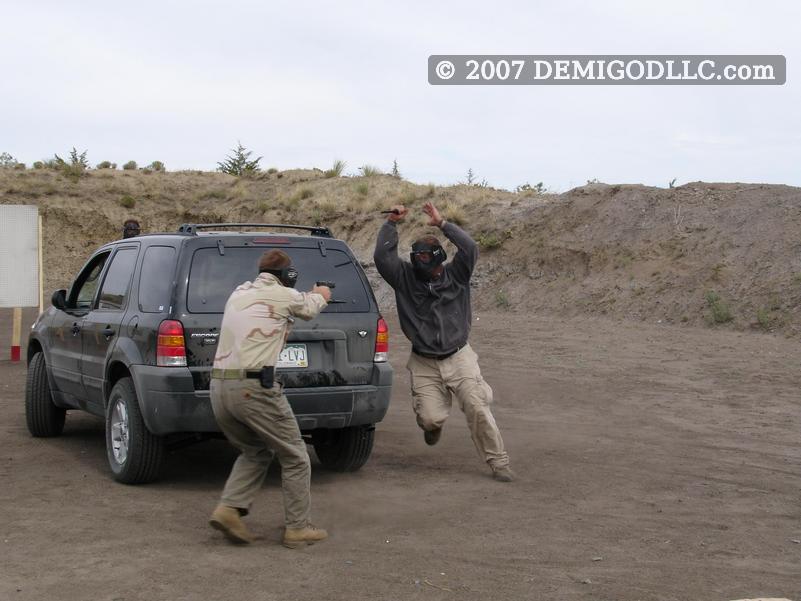 [ link to LARGER image ] [ link to LARGER image ]
__________________
Zak Smith . DEMIGOD LLC . THUNDER BEAST ARMS CORP . COLORADO MULTI-GUN My PM inbox full? Send e-mail instead.
|
|
|
|
|
|
#141 |
|
Senior Member
Join Date: October 31, 2000
Location: Texican!
Posts: 4,453
|
Zak, don't confuse them with facts. Some might think if you practice, really practice, you might retain that skill and use it under pressure.
And David, If you own a car, but never drive but once a year, you sure aren't much of a driver, are you? If you ski once a year, are you a skier? Owning a gun does not make you a shooter, nor does it make you capable of using it well. Way to many people buy a gun for protection but never really get familiar with it. We see that all the time on the range. People putting on their ear muffs with loaded guns in their hands, others switching the gun holding hand to fetch a magazine to load it. And then their groups, at very modist ranges, look more like a grenade fragment pattern. So, yea, you have your defininition, and most others have another.
__________________
“To you who call yourselves ‘men of peace,’ I say, you are not safe without men of action by your side” Thucydides |
|
|
|
|
#142 | ||||
|
Junior member
Join Date: January 24, 2005
Location: SW Louisiana
Posts: 2,289
|
Quote:
Quote:
Quote:
Quote:
|
||||
|
|
|
|
#143 | |
|
Junior member
Join Date: January 24, 2005
Location: SW Louisiana
Posts: 2,289
|
Quote:
|
|
|
|
|
|
#144 | ||||
|
Junior member
Join Date: January 24, 2005
Location: SW Louisiana
Posts: 2,289
|
Quote:
Quote:
Quote:
Quote:
|
||||
|
|
|
|
#145 | |
|
Senior Member
Join Date: March 21, 2006
Posts: 943
|
Quote:
If you carry a firearm everyday in no matter what capacity, IMO if you can't devote 15 mins twice a week to train, then your values are skewed. |
|
|
|
|
|
#146 | ||
|
Senior Member
Join Date: December 12, 1999
Location: Fort Collins, Colorado, USA
Posts: 2,682
|
Quote:
Quote:
__________________
Zak Smith . DEMIGOD LLC . THUNDER BEAST ARMS CORP . COLORADO MULTI-GUN My PM inbox full? Send e-mail instead.
|
||
|
|
|
|
#147 |
|
Senior Member
Join Date: October 31, 2000
Location: Texican!
Posts: 4,453
|
Several years ago, my wife and I were walking by the UC building on the University of Texas at Austin campus. Well while we were walking I had this whistle in my nose (yea yea, I know the Senfield jokes.) When my wife heard the whistle, she, being startled, turned in my direction and to me seemed to be looking over my shoulder. Fearing attack, I swapped directions with both hands up ready to fight (not covering my face, as is natural, but fist closed, right side arm forward, left side elbow shielding my diaphram, and a fairly good 'L' stance with bladed body.)
Was that a natural reaction? The turning was, but the way I held my hands and my 'stance' sure wasn't. This was all because of training. No you don't forget training if you train hard. And the more thorough the training the more the 'fine motor skills' will hold up. That and a good set of guts will get you through the situation.
__________________
“To you who call yourselves ‘men of peace,’ I say, you are not safe without men of action by your side” Thucydides |
|
|
|
|
#148 | ||
|
Senior Member
Join Date: August 13, 2005
Posts: 266
|
Quote:
Quote:
Why? They don't even assume the instinctive combat crouch or move off the x. They aren't scared because they know they're perfectly safe and well protected and it's only BB guns. Geeeeez. It's a game..... As for FoF, it only rocks....at first. It's great 'tactics' training. But it quickly loses its stress-training effect as the players realize that there is no 'real' threat or 'fear of dying' and they attempt maneuvers that they probably wouldn't do in reality. I say, take off all the protective gear. Use the BB guns against only a tank top, shorts and goggles. That might put a tiny bit of fear and pain in the game and produce more realistic reactions. IMO, one should train in the basic skills that remain useable in very high stress encounters. Train in the fear-of-dying physiological and mental responses that one 'will' default to in a sudden CQ gunfight....such as 'instinctively' move off the x as they face the threat, assume a combat crouch, focus with both eyes on the threat and not the sights, extend arm/s, one-handed, tight grip and squeeze off multiples......because that's how most people will react to the fight. .
__________________
First off.....'she' is a weapon, not a girlfriend; a genderless, inanimate mechanism designed to mete out mayhem in life threatening situations. |
||
|
|
|
|
#149 |
|
Junior member
Join Date: June 7, 2002
Location: NYC
Posts: 363
|
Those pictures show a lot of natural reactions going on..
Shoulders squared to the target, gun hands extended, eyes focused on the threat and..dare I surmise..some two handed point shooting? In other words, several solutions grounded in the tradition of gross motor skills. Interesting to see no Weaver stances in the bunch. In some of the photos--especially in the last two--I think the shooter would have been able to move off line if they had one hand on the gun rather than two, but hey...I sure as hell do not want to appear dogmatic. |
|
|
|
|
#150 | ||
|
Senior Member
Join Date: December 12, 1999
Location: Fort Collins, Colorado, USA
Posts: 2,682
|
Quote:
It doesn't. Those photos of actual FOF training prove it. Quote:
Second, you are factually incorrect to assume nobody is moving off the X. If you look at what is happening in each of the photos, you can see the movement. All the students are moving backward and/or laterally. Sometimes the facts agree with you and sometimes they don't. In this case, they don't, and they refute your earlier assertion.
__________________
Zak Smith . DEMIGOD LLC . THUNDER BEAST ARMS CORP . COLORADO MULTI-GUN My PM inbox full? Send e-mail instead.
|
||
|
|
 |
|
|